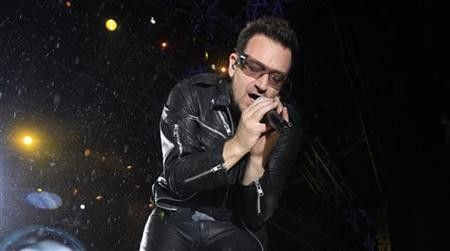Bono and N'Dour to Hold Famine Concert in Kenya

Irish musician Bono and Senegalese singer Youssou N'Dour are planning a global Olympic-style torch relay, culminating in a concert in Kenya in 2012 to raise funds and awareness about the hunger crisis in the Horn of Africa.
We are launching an initiative called New Africa, including African countries and friends of Africa, starting with the ideas of the youth, N'Dour told a news conference Wednesday, a day after visiting the world's largest refugee camp in Kenya.
The youth are the future of our continent, he said.
Dadaab in northern Kenya is home to some 427,000 Somali refugees fleeing famine and war. Hundreds of Somalis are dying each day with 750,000 facing imminent starvation, the United Nations said Monday.
N'Dour said he will hold a competition for young people to design a solidarity torch which will tour the world from September until February.
As part of the relay, there will be events in each participating country to support the campaign, including the African Nations Cup soccer tournament to be held in Gabon and Equatorial Guinea in 2012.
Bono and N'Dour have previously campaigned together at the G8 for debt relief and against HIV/AIDS and malaria.
(Bono) called me to tell me... 'You can count on me because I'm a friend of Africa and I'm going to support you completely', said N'Dour.
HOPE AMID SUFFERING
In an emergency ward in Dadaab, N'Dour swatted flies from the emaciated body of three-year-old Ibrahim Ibrahim, who weighed just 6.7 kg.
His father described how the family had walked for 15 days to escape drought, famine and insecurity in Somalia's Lower Juba region. The arduous trek killed two of his seven children.
Despite such suffering, N'Dour said he saw hope in Dadaab when he visited Illeys Primary School, where many of the dusty-faced young refugees were learning in tents or under trees.
I saw children who spoke, who sang, who smiled and who only wanted one thing: to be like other children, he said.
The number of pupils in the school has surged to 4,039 from 2,500 since January due to an influx of refugees from famine-stricken Somalia. Many had never set foot inside a school before.
We have learners coming armed with knives, small boys of eight or 11, said Henry Waitindi, an education officer with the charity Care International.
Only 38 percent of children in the camp attend school, with classes of up to 150 pupils.
Generations of young Somalis are growing up in Dadaab, which was set up in 1991, without the right to work or leave the sprawling desert camp. Some are recruited to join militias back in Somalia.
I prayed to God that those children would not stay in the camp for another 20 years, said N'Dour. These young people must have a future.
African leaders meeting in Nairobi this week to discuss the Horn of Africa's food crisis have a historic responsibility to ensure Africa never experiences another famine, N'Dour said.
The problem is not money. It's strategy. It's vision, he said.
© Copyright Thomson Reuters 2024. All rights reserved.





















